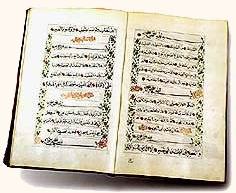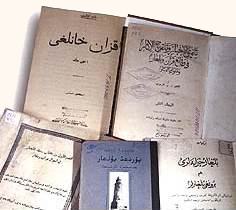Society > Culture > Tatar National Traditions, Culture and Art > Written Language Development, Literature
Written Language Development, Literature
Turkic written language has ancient traditions. Already in the 5-6th centuries, the All-Turkic Runes were widely used. Samples of the Old Turkic written language survived on the stone steles of the time.
 | |
| The Hand-written Koran XIX |
The following centuries of literature development gave a lot of outstanding names and works such as "Gulis-tan bitturki" by Saifa Sarai, "Tukhvai Mardan" and "Nary Sodur" by Mukhamedyar and many others. All these works show a high level of development of the written literature and spiritual life in general, being the most valuable memorials of the medieval Eastern poetry and philosophy.
While at the first stage of development Tatar literature knew only poetic genre, from the 18th century it enjoys prose development as well. The 19th and early 20th centuries were marked by the appearance of a whole pleiade of outstanding writers such as G.Tukai, K.Nasyiri, G.Kamal, M.Gafuri, G.Iskhaki, F.Amirkhan, G.Ibragimov and others.
 | |
| Backletter Tatar Books |
Up to 1928 the Tatars employed the Arabic script. In 1928-1938, the written language based on the Latin alphabet was introduced, and from 1938 - the one based on the Russian alphabet (Cyrillics).
Tatar folklore is represented by fairy tales, legends, bayits (epics), songs, riddles, proverbs and sayings. The epos of Idegei, similar to that of many Turkic peoples, survived.